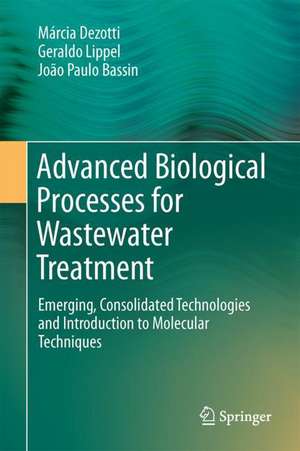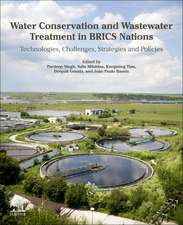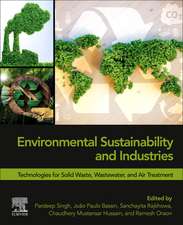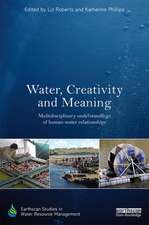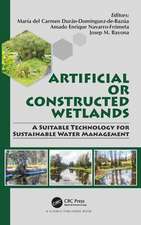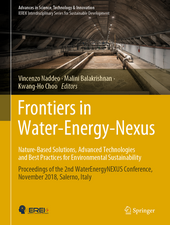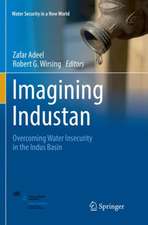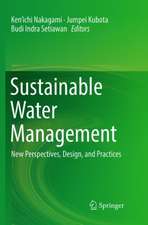Advanced Biological Processes for Wastewater Treatment: Emerging, Consolidated Technologies and Introduction to Molecular Techniques
Autor Márcia Dezotti, Geraldo Lippel, João Paulo Bassinen Limba Engleză Hardback – 20 sep 2017
It describes two of the emerging technologies: membrane bioreactors (MBR) and moving bed biofilm reactors (MBBR), both of which are finding increasing application worldwide thanks to their compactness and high efficiency. It also includes a chapter dedicated to aerobic granular sludge (AGS) technology, and discusses the main features and applications of this promising process, which can simultaneously remove organic matter, nitrogen and phosphorus and is considered a breakthrough in biological wastewater treatment.
Given the importance of removing nitrogen compounds from wastewater, the latest advances in this area, including new processes fornitrogen removal (e.g. Anammox), are also reviewed.
Developments in molecular biology techniques over the last twenty years provide insights into the complex microbial diversity found in biological treatment systems. The final chapter discusses these techniques in detail and presents the state-of-the-art in this field and the opportunities these techniques offer to improve process performance.
| Toate formatele și edițiile | Preț | Express |
|---|---|---|
| Paperback (1) | 583.52 lei 38-44 zile | |
| Springer International Publishing – 18 aug 2018 | 583.52 lei 38-44 zile | |
| Hardback (1) | 951.14 lei 6-8 săpt. | |
| Springer International Publishing – 20 sep 2017 | 951.14 lei 6-8 săpt. |
Preț: 951.14 lei
Preț vechi: 1159.94 lei
-18% Nou
Puncte Express: 1427
Preț estimativ în valută:
182.02€ • 188.95$ • 151.78£
182.02€ • 188.95$ • 151.78£
Carte tipărită la comandă
Livrare economică 22 martie-05 aprilie
Preluare comenzi: 021 569.72.76
Specificații
ISBN-13: 9783319588346
ISBN-10: 3319588346
Pagini: 322
Ilustrații: V, 299 p. 79 illus., 45 illus. in color.
Dimensiuni: 155 x 235 mm
Greutate: 0.61 kg
Ediția:1st ed. 2018
Editura: Springer International Publishing
Colecția Springer
Locul publicării:Cham, Switzerland
ISBN-10: 3319588346
Pagini: 322
Ilustrații: V, 299 p. 79 illus., 45 illus. in color.
Dimensiuni: 155 x 235 mm
Greutate: 0.61 kg
Ediția:1st ed. 2018
Editura: Springer International Publishing
Colecția Springer
Locul publicării:Cham, Switzerland
Cuprins
Chapter 1 Introduction.- Chapter 2 Membrane Bioreactors MBR's.- 3.Moving bed biofilm reactor MBBR.- Chapter 4 Aerobic Granular sludge technology.- Chapter 5 New process for biological Nitrogen removal.- Chapter 6 Molecular biology techniques applied to the study of microbial diversity of wastewater treatment systems.
Notă biografică
1. Prof. Dr. Marcia Dezotti is full professor of the Federal University of Rio de Janeiro, Brazil. She obtained her D.Sc. degree from the State University of Campinas in 1992 and a post-doc at North Carolina State University in 2011/2012. She works with advanced oxidation processes, biological treatment of wastewaters and micropollutants, including estrogens. She has more than 80 peer-reviewed papers published in indexed journals. She was advisor of 29 PhD thesis and 41 MSc. She won important awards in Brazil. She has international connections with University of Barcelona, University of Porto, TUDelft, Harvard University, among others. She has HH index of 22 with more than 1,500 citations.
2. Prof. Dr. Geraldo Lippel Sant’Anna Jr. is full professor of the Federal University of Rio de Janeiro, Brazil. He got his D.Sc. degree at the National Institute of Applied Sciences (INSA) of Toulouse, France, in 1980. Retired since 2008 from the university, he still participates in technical and academic projects besides his activity as consulting engineer. He published a book on Biological Wastewater Treatment in 2010, whose second edition was recently published (2013). He has published more than 75 peer-reviewed papers and since 2006 is a member of the Brazilian Academy of Sciences.
3. Prof. Dr. João Paulo Bassin is chemical engineer and got his PhD degree at the Technical University of Delft, Holland, and D.Sc. degree at the Federal University of Rio de Janeiro, Brazil, both in 2012. He works with biofilm processes for biological wastewater treatment and molecular techniques to elucidate microbial diversity of the bioreactors. Nowadays he is Associate Professor at the Chemical Engineering Program (COPPE) at Federal University of Rio de Janeiro.
2. Prof. Dr. Geraldo Lippel Sant’Anna Jr. is full professor of the Federal University of Rio de Janeiro, Brazil. He got his D.Sc. degree at the National Institute of Applied Sciences (INSA) of Toulouse, France, in 1980. Retired since 2008 from the university, he still participates in technical and academic projects besides his activity as consulting engineer. He published a book on Biological Wastewater Treatment in 2010, whose second edition was recently published (2013). He has published more than 75 peer-reviewed papers and since 2006 is a member of the Brazilian Academy of Sciences.
3. Prof. Dr. João Paulo Bassin is chemical engineer and got his PhD degree at the Technical University of Delft, Holland, and D.Sc. degree at the Federal University of Rio de Janeiro, Brazil, both in 2012. He works with biofilm processes for biological wastewater treatment and molecular techniques to elucidate microbial diversity of the bioreactors. Nowadays he is Associate Professor at the Chemical Engineering Program (COPPE) at Federal University of Rio de Janeiro.
Textul de pe ultima copertă
This book presents recent developments in advanced biological treatment technologies that are attracting increasing attention or that have a high potential for large-scale application in the near future. It also explores the fundamental principles as well as the applicability of the engineered bioreactors in detail.
It describes two of the emerging technologies: membrane bioreactors (MBR) and moving bed biofilm reactors (MBBR), both of which are finding increasing application worldwide thanks to their compactness and high efficiency. It also includes a chapter dedicated to aerobic granular sludge (AGS) technology, and discusses the main features and applications of this promising process, which can simultaneously remove organic matter, nitrogen and phosphorus and is considered a breakthrough in biological wastewater treatment.
Given the importance of removing nitrogen compounds from wastewater, the latest advances in this area, including new processes fornitrogen removal (e.g. Anammox), are also reviewed.
Developments in molecular biology techniques over the last twenty years provide insights into the complex microbial diversity found in biological treatment systems. The final chapter discusses these techniques in detail and presents the state-of-the-art in this field and the opportunities these techniques offer to improve process performance.
It describes two of the emerging technologies: membrane bioreactors (MBR) and moving bed biofilm reactors (MBBR), both of which are finding increasing application worldwide thanks to their compactness and high efficiency. It also includes a chapter dedicated to aerobic granular sludge (AGS) technology, and discusses the main features and applications of this promising process, which can simultaneously remove organic matter, nitrogen and phosphorus and is considered a breakthrough in biological wastewater treatment.
Given the importance of removing nitrogen compounds from wastewater, the latest advances in this area, including new processes fornitrogen removal (e.g. Anammox), are also reviewed.
Developments in molecular biology techniques over the last twenty years provide insights into the complex microbial diversity found in biological treatment systems. The final chapter discusses these techniques in detail and presents the state-of-the-art in this field and the opportunities these techniques offer to improve process performance.
Caracteristici
Discusses biological processes that are having an important impact in the global market or will have in the near future Enables readers not familiar with biological and biochemical concepts to handle molecular biology techniques (DGGE, FISH, Cloning, DNA Sequencing) Describes how to use molecular biology tools to control process performance Clarifies the advantages and disadvantages of different wastewater treatment processes Provides abundant references to allow interested readers to explore the subject in more depth Presents recent advances in nutrient removal
